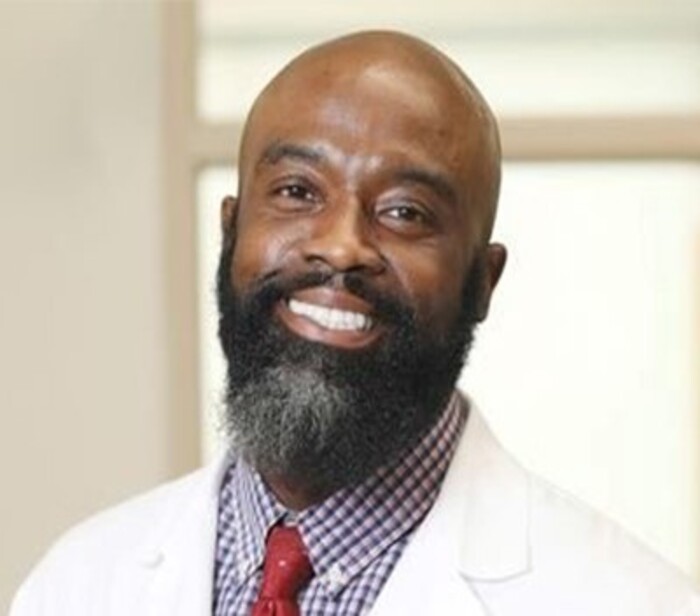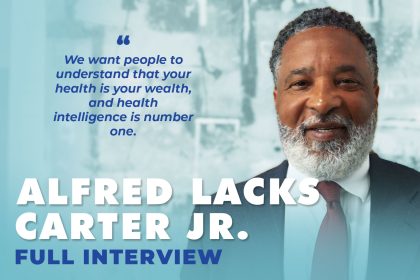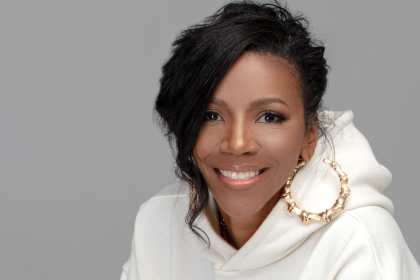In the humid July afternoons of his childhood in rural Ivanhoe, North Carolina, while other boys played outside, Melvin Echols could be found indoors, sweating over encyclopedias, fascinated by science. Today, as associate professor of medicine at Morehouse School of Medicine and a heart failure clinical trialist, Dr. Echols brings that same curiosity to his work, now deepened by an extraordinary personal journey that has transformed his understanding of patient care.
“Growing up, we were able to experience the not-so-great side of cardiovascular disease, particularly things like sudden cardiac death and acute presentations for heart attacks,” he explains during our conversation. Several of his family members suffered from heart conditions, fueling his early interest in cardiology. But no one could have predicted how intimately familiar he would become with the patient experience.
From rural North Carolina to medical pioneer
The path from rural North Carolina to becoming a cardiologist was neither straight nor easy. On long school bus rides home, when classmates discussed future dreams, young Echols would confidently state his intention to become a cardiologist. The response? Laughter.
“People looked at me and laughed as if that was the hilarious joke of the season,” he recalls, still seeming slightly bemused by their reaction. “I didn’t really see anything funny, because I had already read about it. I was already exposed to what it was going to take to get there.”
That determination carried him through Morehouse School of Medicine, where he graduated in 2002, followed by extensive specialized training. In 2019, he returned to Morehouse as faculty, bringing with him not just medical expertise but a deep understanding of the demographics of cardiovascular disease in rural regions—knowledge rooted in personal experience.
The day everything changed
In 2023, what should have been a routine outpatient procedure became a life-altering crisis for Dr. Echols. A complication led to four months of hospitalization, with three months on a ventilator and dialysis. He lost 150 pounds and had to relearn basic functions most take for granted, walking, talking, eating.
“I had to depend on everyone for every single function of my life for six months,” he says, his voice steady as he recounts the ordeal. “I was even on ECMO, which is a very complicated circulatory system required for people who have worse and damaged hearts.”
For a cardiologist who had spent his career treating critically ill patients, the role reversal was profound. “Learning how to walk in a patient’s shoes, who happens to be critically ill, is a whole other game in terms of relating to what it really takes to be resilient as a patient.”
This experience has fundamentally changed his approach to medicine. “I loved my patients before, but now I carry that with me,” he says. The near-death experience also prompted him to write about risk relevancy and what it means to patients, noting, “Patients don’t assume that risk until it actually happens.”
The 3 qualities that define excellence in cardiology
When asked about the most important skills for cardiologists beyond medical knowledge, Dr. Echols doesn’t hesitate in identifying them:
- Listening is non-negotiable. “You cannot be a good doctor if you do not know how to listen to patients. As a matter of fact, that’s the most important thing,” he emphasizes. “We can always look up facts, we can always look up trials, but if you’re not hearing what a patient is telling you, you’re starting off on the wrong foot.”
- Vulnerability creates connection. Learning to share parts of your own story can be powerful medicine. “When I have patients in the ICU and I’m telling them, ‘Hey, two years ago I was right here, looking exactly like you, probably worse, but God is good,'” he explains, “it definitely has weight to it.”
- Quality as the unwavering standard. In a medical environment that increasingly focuses on metrics and procedures, Dr. Echols maintains that excellence must remain the benchmark. “As long as you are able to live your life making sure that you’re doing the best that you can, that’s the quality, and that’s the standard.”
Addressing disparities in heart care
As Chief DEI officer for the American College of Cardiology, Dr. Echols is acutely aware of the disparities that persist in cardiovascular medicine. “African American men and women are more likely than any other group in the US to die earlier from heart failure and usually have less access to therapies like transplants and mechanical circulation,” he notes.
His approach to addressing these inequities focuses on three key areas: increased access to care, greater emphasis on prevention, and deeper community engagement. At Morehouse, this philosophy is built into the training. “The first thing they did the first year was put us in the community and get us used to talking to people about their community,” he explains.
Dr. Echols has also been instrumental in creating exposure programs for underrepresented groups in medicine through the ACC. These initiatives create psychological safety by allowing aspiring cardiologists to see people who look like them succeeding in the field. The programs include cohorts for African Americans, women, Native Americans, and LGBTQ individuals.
“So that people can walk in and see cardiologists of all kinds that are doing what you want to do and giving you the engagement and the empowerment to say, ‘Yeah, you can get here,'” he explains.
The future of heart care
As co-director of an AI fellowship for full-time clinicians through the AIM-AHEAD NIH grant, Dr. Echols sees tremendous potential in technology, but also cautions against overreliance on tools that may perpetuate existing inequities.
“I think AI can be an amazing addition and supplement to medicine, but as anything, it’s a test and it’s a tool,” he says. “If you’re not quite sure how this tool is designed, then you run the risk of actually using the tool in not the most optimal way.”
His concerns extend beyond just the technology itself to how it might affect medical education. “Because trainees see AI do wonderful things in terms of pulling up facts and putting together diagrams and pictures, in their minds, I’m wondering if they are considering that they’re learning that information,” he reflects.
When discussing the future of cardiovascular research, Dr. Echols highlights the importance of precision medicine and a stronger focus on the earlier stages of heart failure. Too often, he explains, heart failure is only identified when a patient is hospitalized, when in reality, the condition develops gradually over years.
“There are way more people who actually have what we call stage B heart failure, which are risk factors or structural changes already that they don’t even know about,” he says. “Looking into heart failure and the spectrum and pushing the needle back a little bit more to prevention will definitely be a key.”
For the approximately 600,000 Americans diagnosed with new-onset heart failure each year, this shift toward earlier intervention could be life-changing. It could be particularly significant for Black Americans, who face higher rates of hypertension, diabetes, and obesity, all major risk factors for heart failure.
The encyclopedia reader becomes the storyteller
The boy who once pored over encyclopedias while others played outside has become not just a physician but a storyteller, using his own narrative to bridge gaps between doctor and patient, science and humanity. His journey from rural North Carolina to renowned cardiologist, and from doctor to patient and back again, offers a profound lesson in resilience and purpose.
“No matter what happens, if you’re still here, you always have another chance to try again,” Dr. Echols says, a philosophy that has carried him through personal and professional challenges alike.
In a medical specialty defined by precision and technology, Dr. Echols reminds us that the heart’s most powerful medicine may not be found in prescriptions or procedures, but in presence, in the ability to truly listen, to share vulnerability, and to maintain unwavering standards of excellence. It is a lesson written not in the pages of medical journals, but in the lived experience of walking in his patients’ shoes.













